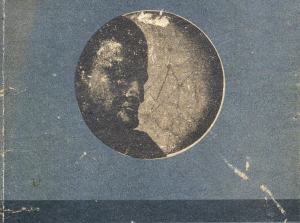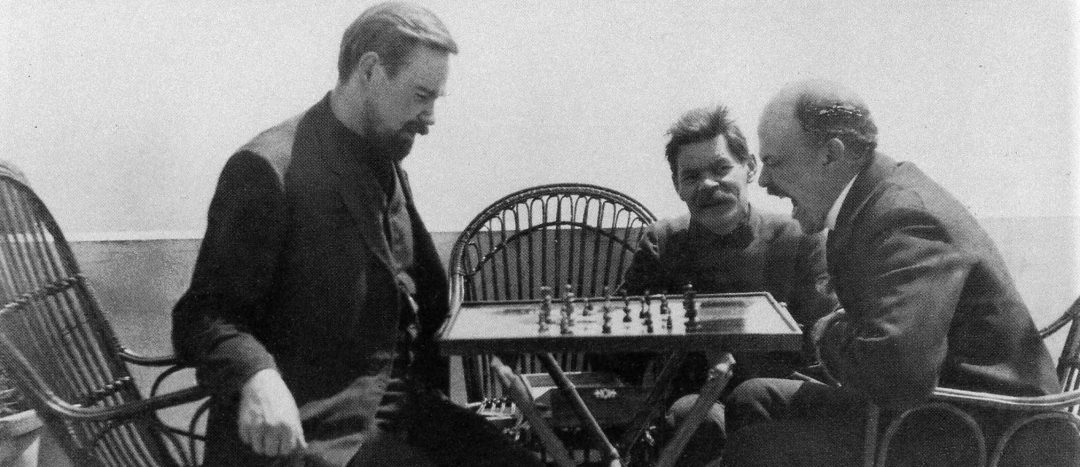Engineer Menni and the Prose of Project Management

The recent efforts of Mckenzie Wark to rehabilitate Bogdanov have brought back more than just the lovable vampiric theorist from his bloody grave. With him emerge the concurrent spectres of utopia, state socialism and grandiose public works. Bogdanov, the activist revolutionary of 1905, had by 1917 become a theorist of the abstract, a scientific socialist, and a constructor of tangible Martian utopias. It is on Mars that Bogdanov pursues the doppelganger of Earthly socialism, and so, it is to Mars we go, by means of the collected translation Red Star: The First Bolshevik Utopia.
What is Mars for Bogdanov? If he defines Nature as “that which labor encounters,” Mars becomes something like “that which theory encounters”.
Mckenzie Wark makes use of the Deleuzian notion of molar and molecular in order to reach Bogdanov. If the molar is the realm of abstract grand thinking, high level concepts, and authoritarian pronouncements, then the molecular is the unseen, the below the below, the minute and particular, carbon liberation, and the world of “actually existing theoritism”. We must contrast the molar concepts of history, philosophy, love, art, with the molecular concepts of metabolic rift, development, attraction, and labor.
What does Bogdanov’s Mars represent? It is a world that is much older than ours, and yet has only progressed a few hundred years ahead of humanity (at least by 1905 – who knows what they’re up to now). They are a communist utopia of course, but have graduated to that position in much more molar way than the Earthlings were trending; because Mars is a harsher, larger, and sadder world, the populace, constrained to smaller plots of inhabitable land; Martians are much more tolerant of social development, much less cruel, much more abstract themselves as historical characters. Leonid (or affectionately, “Lenni”), the main character of Red Star, notices in Martian culture, art, politics, a certain abstract remove which contrasts with the brashness and threatening asymmetry of the development of the proletarian movement on Earth. As comes out in discussion:
“I don’t know,” he said thoughtfully, “but I think that you are wrong. True, the conflicts on Earth have been more acute than ours, and the natural environment has always shown a greater tendency to retaliate with death and destruction. But perhaps this is due to the fact that Earth is so much more richly endowed with natural resources and the life-giving energy of the sun. Look how much older our planet is, yet our humanity arose only a few tens of thousands of years before yours and is at present a mere two or three hundred years ahead of you in development. I tend to think of our two humanities as brothers. The elder one has a calm and balanced temperament, while the younger one is stormy and impetuous. The younger one is more wasteful with his resources, and prone to serious errors. His childhood was sickly and turbulent, and as he now approaches adolescence he often suffers from convulsive growing pains. But might he not become a greater and more powerful artist and creator than his elder brother? And in that case, will he not eventuaily be able to adorn our great Universe even better and more richly? I cannot be certain, but its seems to me that this is what may happen.”
Which is the molecular and which is the molar? In some sense, Mars is the same sort of abstraction as that used by Marx in Das Kapital, the abstractions that David Harvey’s brilliant youtube course makes commodity-clear; in Marx, certain real variables must be factored out of the equation because they over-complicate the development of a solution or tendency. In this sense, Martian society has progressed along molar lines. Big ideas have always managed to triumph with relative ease; the great public works of the canals have succeeded. Earth, on the other hand, is out-of-whack; it is full of metabolic rift, molecular instability, ideas emerge too soon or too late, and coalitions are much more radioactive. They even have a chiller, more widely read Martian doppelganger of Karl Marx, the “renowned Xarma”.
In this we see, not a rejection of the molar as such as Wark sometimes seems to suggest, but a comparison of the abstract with the concrete – by means of hypothetical abstraction (science fiction). The model of Mars, the cool temperaments of its inhabitants, serve as a template that the Earth is already corrupting beyond repair. In this sense, the Martian sequence can never be a program for the Earth, only ever a vague, super-egoic tease, an unreachable success-factor. Or in a more optimistic vein, Martian technical socialism is the idea that must be pursued by the various romantic truth procedures of love, science, art and politics on Earth, pursued but never fully actualized. Only on Mars is a cohesive “poetics of labor” capable of emerging as a whole. Maybe all that Earth can hope to do in the stead of a fully realized poetics of labor, is capture that movement into a banal realism, a “prose of project management”?
It is funny that Red Star, the more traditional utopia of travel, was a huge best-seller during the Russian Revolution, while its much superior prequel Engineer Menni went pretty much unnoticed. Yet the latter is perhaps the heart of Bogdanov’s project; to turn vulgar Marxism into a technical ideal of socialism, and this technical development, through the figure of the Engineer – the Martian Engineers Menni and Netti, who pre-figure the stupid figures of socialist realism and far surpass them.
Engineer Menni gives humanity hope that it can reach the molar one day too. It is the great manifesto of molar projection. The book is presented as a novel from Mars, translated into English by Leonid. As Leonid mentions in Red Star, there is a certain coolness to Martian literature that seems to find more aesthetic joy in the technical – a kind of latent suprematism or Neue Sachlichkeit. Bogdanov is true to his word when, in Engineer Menni, he really does compose such a novel. The device of writing, not about aliens, but an alien novel as such, is really quite brilliant. The gesture practiced in Menni is very compelling, nigh Lovecraftian in its staging of uncanny familiarity:
Translation from the single Martian language into those of Earth is much more difficult than translation from one Earthly language to another, and it is often even impossible to give a full and exact rendering of the content of the original. Imagine trying to translate a modern scientific work, a psychological novel, or a political article into the language of Homer or into Old Church Slavonic. I am aware that such a comparison does not Batter us Earthlings, but it is unfortunately no exaggeration-the difference between our respective civilizations is just about that great.
But who is Menni? The molar hero. The great architect, engineer, project manager, and a Lycurgus or pre-foundational figure of vulgar, technical, molar Marxism. The novel is about his great project and his interpersonal relationships, but moreso the former. Menni has an idea that will greatly expand the territory of Martian life and progress, exploit the untapped resources of the planet, and progress the species of Martian humanity, which feels cramped and narrow in its tiny pockets of inhabitable land, much like the characters in more recent fictions like Attack on Titan.
This is a socialist realist technique, to write about public works, and the great (projected) unity of state, technology, and labor against the elements. The whole trend of Bogdanov’s science fiction is the unity of labor against natural ferocity. He refutes a future left of localism not yet developed in his era; as Žižek proclaims, the Negri style pockets of progress and local contributions do not suffice to deal with the problems of a socialist race, even once the proletariat has conquered. The real enemy is not a rival class, but nature herself.
Thus in Red Star, the great debate of the Martians is whether to colonize Earth or Venus. Placid and artistic, hedonistic even on the surface, the Martians are all bitterly melancholic because the natural world is trying to kill them and their socialist paradise; a dilemma emerges – colonize and kill the humans in the name of a greater more developed humanity (the view of the Martian Sterni) or go to the inhospitable Venus to mine its resources? They have only enough fuel for one project, and they choose the more comradely, leaving Earth its chance.
Menni shows more the pure poetry of labor and project management, a struggle against organizational inertia and natural obstacles, and how class development and ideational progress attach themselves to technical developments in the concrete world. It is a strange novel. The strangest part is the long hallucinatory sequence of the vampire, the representative of old ideas and once-useful historical processes, like democracy or parliamentarism, that have become dead letters but continue to live on and pester the progressive forces.
Technicality triumphs, and history goes with her, but only, it seems, on Mars.
So far.
We have signs. Everybody on Earth now speaks English. The Martians too had a coming together of language. Beercroft’s “universal language” is now a reality.
But the idea lives on after the man disappears, and you have come to understand the main thing: the creativity that found one of its incarnations in you has no end.
The possibility of the Project Management Novel
So that’s why I came up with the phrase “prose of project management”, as a kind of realist response to the Bogdanovite “poetry of labor”. We need to recognize that tektological and organizational thinking brings about a weird counter-swing from the molar to the molecular and back to the molar again. Like Bogdanov’s notion of “crisis” as either a conjunction or a destruction (crisises C and D respectively). His point is that no crisis is just a pure crisis-D or crisis-C, but that the interesting features of either can appear to be dominantly one or the other, depending on your point of observation. Likewise, the “poetry of labor” needs its “managemental prose”. This is the molar prose of the technical abstraction, the Brechtian “crude thinking”, the concept-as-blunt-object used by committees to bludgeon reactionaries.
This is clearly a different spin on the idea of the “project” from the (quite molecular) “project-as-self” or any other individualistic narcissism; it is almost classically soviet in comparison to what is prevalent today. It should not be taken in the same vein as the Invisible Committee describes the “I AM WHAT I AM”, the petty atomistic personal project of the self:
The maintenance of the self in a permanent state of deterioration, in a chronic state of near-collapse, is the best-kept secret of the present order of things. The weak, depressed, self-critical, virtual self is essentially that endlessly adaptable subject required by the ceaseless innovation of production…It is at the same time the most voracious consumer and, paradoxically, the most productive self, the one that will most eagerly and energetically throw itself into the slightest project, only to return later to its original larval state.
The PM methodology to be derived from Bogdanov emphatically rejects this. No slight projects, no larval pupas, and certainly no return. In this sense, molar.
Like the dreams of Benjamin, Platonov, Ehrenberg, Lunacharsky, and Piscator, among many others, the hope of functionalizing or socializing the novel form is so old to criticism that it’s surprising that it hasn’t actually manifested itself more frequently. The valorization of the report, the blueprint, the newspaper as aesthetic endstates was a constant refrain in the 1920s. Eventually this led to a re-capture within literature itself – Brecht and Alfred Döblin, for example, made heavy use of reportage and workerist flavoured functionality for artistic ends.
If rhyme really is of feudal provenance, then the same may be said of many other good and beautiful things.
If the Soviet Union’s contribution to the great unreadable genres of mankind was the production novel, Engineer Menni stands as an elegant and surprisingly readable precursor. Yet although production is certainly an element, it is far more high level. We see in Menni the possibility for something like a management or project novel. A novel or literary form that takes as its architecture not story arcs, but phases; not character development, but resource management; not plot resolutions, but outcomes; and finally, not moral platitudes or zen like moments of observation, but strictly documented lessons learned.
All of a suddenly he understood that one didn’t have to invent it all from scratch, that it was a matter of making something new by synthesis of all that was good in what came before.
Kim Stanley Robinson.
This functional trend seemed to have gone away for awhile. But the rehabilitation of Red Star/Engineer Menni opens up the possibility for a severe détournement; the language of management, organization, abstract project coordination can be stolen for aesthetic development. And once the literary captures this thinking, it can return it back with a vengeance. No longer will the notions of finance or human resources be linked to solely spreadsheets; a utilitarian flavor will remain, but legends and heroes, or perhaps even new methodologies embodied as heroes. Engineer Menni stands for both a political finality or class division, and a new methodology for the commune as a whole. A vindication of the major or state project, and as such, an aesthetic as much as political vindication.
Our Cause | Two Grenadiers (wordpress.com)


